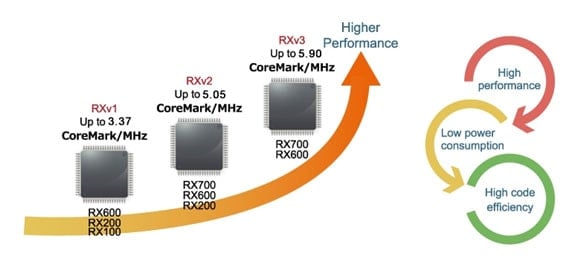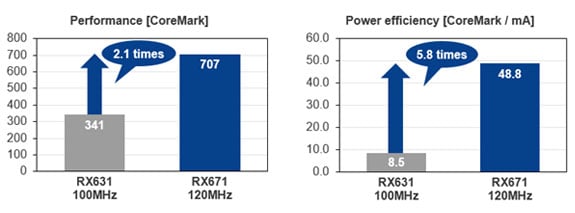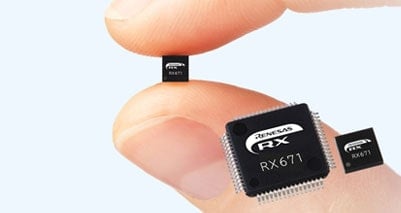With the growing interest in DX (Digital Transformation), the use of IoT in consumer electronics and industrial equipment is increasing. These IoT endpoints are not limited to sending collected data to the Cloud, but many are also required to perform AI-based procedures, such as voice recognition and touch keys from HMI to failure prediction.
For 10 years since the introduction of the RX630 featuring the world's first high-speed, large-capacity flash memory, we continue to broaden the RX600 series by introducing the RX651 using the RXv2 core and the RX66N using the RXv3 core that has industry-leading performance in its class of microcontroller. Renesas released the RX671, expanding the industry-leading RX600 series product portfolio.
The RX671 is a product with improved processing capability, real-time performance and functionality while maintaining high compatibility with the RX651 MCU for IoT applications, making it possible to meet the needs of a wider range of user requirements. In this blog, we would like to introduce the high performance, multi-function and miniaturization of the RX671.
Higher Performance
The RX family is equipped with Renesas' proprietary RX CPU core. The RX core continues to evolve year by year, and today the industry-leading RXv3 core with a performance of 5.9CoreMark/MHz is developed.

The RX671 is equipped with an RXv3 core, raising its performance by approximately 2.1 times higher than the existing RX631products. Even when compared to other products in the market, RX671 can achieve performance equivalent to 200MHz at only 120MHz clock. In addition to high performance, Renesas' 40-nm manufacturing process has enabled RX671 to achieve the industry’s highest power efficiency of 48.8CoreMark/mA.

Combination of High Functionality and Miniaturization
The RX671 offers a lineup of 4.5mm x 4.5mm square 64-pin BGA packages. Despite a very small package, it contains one of the industry's largest flash memory of 2MB flash and 384KB SRAM. This allows firmware updates required for IoT devices to be realized without external memory. Also, the RX671 comes with capacitive touch sensors (CTSU) which have been very popular in the RX100/200 series for their high-noise immunity. Touch keys with aesthetic design and low maintenance can be realized with just a single chip without additional components. In addition to touch sensors, the RX671 with a serial sound interface (SSIE) give you more option for implementing voice recognition. Voice recognition requires processing capability in real time, executing digital signal processing such as noise suppression and phoneme extraction from input speech waveforms, and a memory that stores trigger words and voice recognition middleware generating a large amount of data. As mentioned above, the RX671 has high computing power and high-capacity memory; therefore, it can implement all these functions with one chip.

Considering the high performance and multifunctionality of IoT devices, it is no doubt that RX671 with enhanced computing capability and functions is the most suitable microcontroller. We continue to support the evolution of IoT devices with the newly added RX671 MCU of the RX600 series!
Watch the webinar for more detailed features of the RX671.
For more information on the RX671, visit www.renesas.com/rx671
News & Additional Resources
| Title | Type | Date |
|---|---|---|
| Renesas Launches 32-Bit RX671 MCUs Realizing High Performance and Power Efficiency with HMI Functions for Contactless Operation | News | Sep 8, 2021 |
